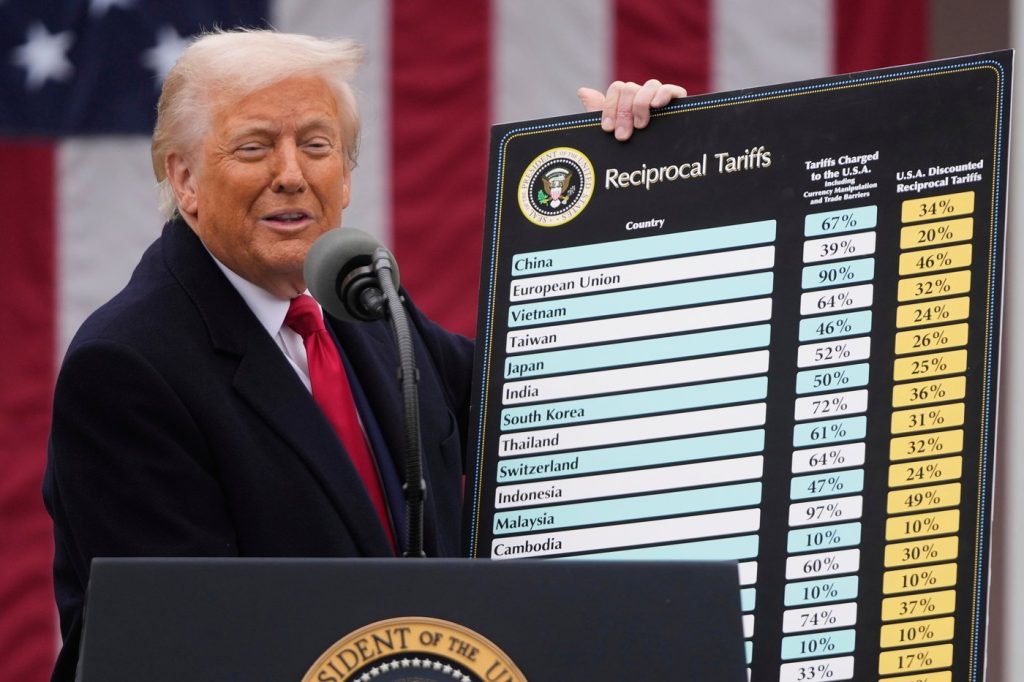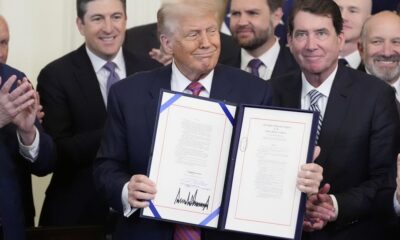Top Stories
Supreme Court Ruling Looms on Trump’s Tariff Power This Week

UPDATE: The Supreme Court will hear critical arguments this week that could reshape President Donald Trump’s use of tariffs, a key component of his foreign policy strategy. The justices will decide if Trump has overstepped his legal authority in wielding tariffs as a tool against foreign nations.
Trump has leveraged tariffs not just for economic strategies but as instruments of foreign diplomacy. He has used them to pressure countries into compliance on various issues, from military engagements to immigration control. A ruling against him could strip away his ability to impose tariffs swiftly, significantly altering his approach to international relations.
Earlier today, Trump expressed his concerns, labeling the case as one of the most significant in U.S. history. He warned that a negative ruling would be a “disaster” for the country. This sentiment highlights his reliance on tariffs as a cornerstone of his administration’s agenda.
The Justice Department argues that Trump’s tariff strategies fall within his constitutional power over foreign affairs. However, lower courts have challenged this interpretation, stating that the International Emergency Economic Powers Act (IEEPA) does not grant him the authority to impose tariffs unilaterally. Earlier this year, the U.S. Court of Appeals affirmed that tariffs are primarily a congressional power, complicating Trump’s administration.
“The fact of the matter is that President Trump has acted lawfully by using the tariff powers granted to him by Congress,” stated White House spokesman Kush Desai.
Trump’s unique approach to tariffs contrasts sharply with previous administrations, which typically favored sanctions over import taxes for foreign policy objectives. Experts note that this unprecedented tactic has created a ripple effect, with some nations adopting protectionist measures in response. Countries like Canada and Brazil have felt the impact, as Trump has threatened tariffs in reaction to various political conflicts.
The upcoming Supreme Court ruling could have profound implications, not just for Trump’s administration but for the global economic landscape. If the court limits his tariff powers, it might lead to a reevaluation of trade agreements recently established under his administration. Emily Kilcrease, a former trade official, emphasized the potential for geopolitical instability should the ruling restrict Trump’s tariff authority.
“There’s literally no precedent for the manner that President Trump is using them,” Kilcrease remarked, highlighting the unusual nature of this approach. “If the court constrains Trump, it could leave foreign governments questioning whether to try to renegotiate trade agreements.”
As this situation develops, businesses and consumers are already feeling the pressure. Many companies have raised prices to offset the costs associated with tariffs, while others are in a holding pattern, awaiting the court’s decision.
With the Supreme Court’s decision looming, the nation is on edge, watching how this pivotal moment will unfold and its potential to reshape U.S. foreign policy and economic strategy. Trump has hinted at personally attending the court hearings, underscoring the urgency he places on this ruling.
As public interest grows, stakeholders from various sectors are closely monitoring the situation. The Supreme Court’s decision could either reinforce Trump’s controversial tariff strategy or force a significant shift in trade policy, impacting not just economics but also international relations and security dynamics.
Stay tuned as we continue to bring you the latest developments on this urgent matter.
-

 World4 months ago
World4 months agoScientists Unearth Ancient Antarctic Ice to Unlock Climate Secrets
-

 Entertainment4 months ago
Entertainment4 months agoTrump and McCormick to Announce $70 Billion Energy Investments
-

 Lifestyle4 months ago
Lifestyle4 months agoTransLink Launches Food Truck Program to Boost Revenue in Vancouver
-

 Science4 months ago
Science4 months agoFour Astronauts Return to Earth After International Space Station Mission
-

 Technology2 months ago
Technology2 months agoApple Notes Enhances Functionality with Markdown Support in macOS 26
-

 Top Stories3 weeks ago
Top Stories3 weeks agoUrgent Update: Fatal Crash on Highway 99 Claims Life of Pitt Meadows Man
-

 Sports4 months ago
Sports4 months agoSearch Underway for Missing Hunter Amid Hokkaido Bear Emergency
-

 Politics3 months ago
Politics3 months agoUkrainian Tennis Star Elina Svitolina Faces Death Threats Online
-

 Politics4 months ago
Politics4 months agoCarney Engages First Nations Leaders at Development Law Summit
-

 Technology4 months ago
Technology4 months agoFrosthaven Launches Early Access on July 31, 2025
-

 Top Stories1 week ago
Top Stories1 week agoFamily Remembers Beverley Rowbotham 25 Years After Murder
-

 Entertainment4 months ago
Entertainment4 months agoCalgary Theatre Troupe Revives Magic at Winnipeg Fringe Festival




















